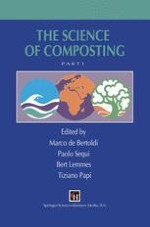1996 | OriginalPaper | Buchkapitel
Composting of Organic Garden and Kitchen Waste in Open-air Windrows: Influence of Turning Frequency on the Development of Aspergillus Fumigatus
verfasst von : Johanna Lott Fischer, Pierre-François Lyon, Trello Beffa, Michel Aragno
Erschienen in: The Science of Composting
Verlag: Springer Netherlands
Enthalten in: Professional Book Archive
Aktivieren Sie unsere intelligente Suche, um passende Fachinhalte oder Patente zu finden.
Wählen Sie Textabschnitte aus um mit Künstlicher Intelligenz passenden Patente zu finden. powered by
Markieren Sie Textabschnitte, um KI-gestützt weitere passende Inhalte zu finden. powered by
Composting at industrial scale (installations treating. 100 tons per year) is increasingly used in Switzerland for the stabilization of organic waste and the recycling of humigenic materials. In 1992, 320.000 tons of garden and kitchen waste were treated in 150 composting sites, 80% thereof treating more than 1.000 t/a (1). Even if mature composts are generally of satisfactory quality, the process itself could often be considerably improved. Our research team is currently involved in a threeyear study that aims at optimizing the thermogenic phase of composting processes, in order to ensure a good thermo-hygienization (elimination of allergenic and pathogenic micro-organisms, e.g. the thermotolerant mold Aspergillus fumigatus) and to improve the number and diversity of the thermophilic micro-organisms. This will lead to a rapid degradation of the organic material. By this, phytotoxicity hazards can also be avoided.
